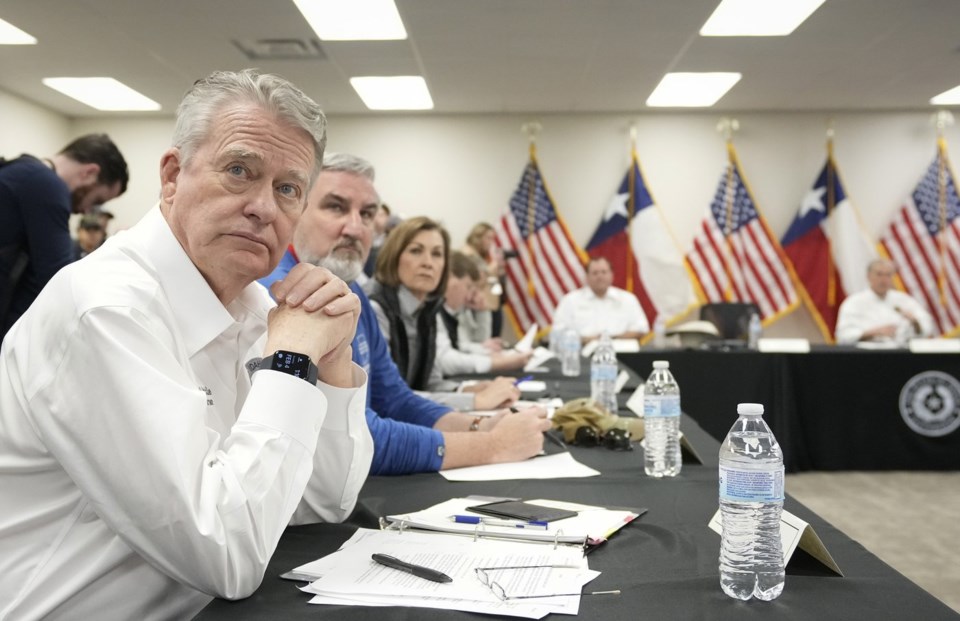The Trump administration is touting an immigration crackdown that includes putting on U.S. military planes, expanding agents' here illegally and that gave some permission to stay.
One tool that's conspicuously absent from President Donald Trump’s efforts to reduce illegal immigration: Going after the businesses that hire workers who are in the U.S. illegally.
A nearly 30-year-old government system called E-Verify makes it easy to check if potential employees can legally work in the U.S.
The program has had high-profile backers. for Trump’s second term, called for it to be mandatory.
Yet it remains largely voluntary and rarely enforced. Trump's own hotels and golf courses were slow to adopt E-Verify.
The debate over workplace enforcement is, in many ways, a reflection of America's complex views on immigration, its economic dependence on immigrant labor and a quietly bubbling Republican divide.
“There are only so many people you can round up and deport” who are criminals or fugitives, said , executive director of the Center for Immigration Studies, which advocates for reduced immigration and has close ties to the Trump administration. “To make a deep reduction in the illegal population it has to be done at least in part through workplace enforcement.”
Trump's order declaring a national emergency at the southern border used dark terms, describing a country in chaos due to an immigrant “invasion” He has linked illegal immigration to violent crime and claimed countries are mental institutions and “insane asylums” to send dangerous people to the U.S.
The reality is often far more prosaic. Many immigrants living here illegally . They're fixing roofs and cars, putting up drywall and running hotels. They're making sure shoppers have lettuce, milk and apples.
Resistance to E-Verify comes from all corners
E-Verify, an online Department of Homeland Security system launched in the late 1990s, can quickly confirm if someone is authorized to work in the U.S., often by using Social Security numbers.
Barely 20% of U.S. employers use it. The 1.3 million that do include Walmart, Starbucks and Home Depot.
Even its staunchest defenders acknowledge there are plenty of ways to cheat it. But most states with E-Verify mandates saw reduced numbers of immigrants working illegally, according to a 2017 study from the Federal Reserve Bank of Dallas.
That, the researchers said, may also discourage more people from entering the U.S. illegally.
“You have to reduce the incentive to cross the border” by making it more difficult to work in the U.S., said Krikorian. “You have to reduce that magnet.”
Yet over the years it has been opposed by everyone from Republican immigration hawks to Idaho dairy farmers, New York hotel owners and construction industry lobbyists.
During the first Trump administration’s budget proposals, language calling for mandatory nationwide E-Verify use was quietly dropped.
In one state legislature after another, many of them Republican dominated, occasional attempts to mandate E-Verify for all employers — or even most — have repeatedly failed. Where it has been mandated, many employers are often exempted.
Idaho exemplifies the complicated reality behind the hard-line talk
Republican lawmakers outnumber Democrats 5-to-1 in Idaho. They've , and Gov. Brad Little has deployed state troopers to the “lawless southern border.”
But they've also pushed back against attempts to require E-Verify.
Agriculture is one of Idaho’s top industries, and its history is steeped in immigration, from the Basque sheepherders of the late 1800s to today’s Dutch-born dairy farmers who spent their childhoods in Nazi-occupied Holland.
Those dairy farmers, in turn, are dependent on more recent immigrants, mostly from Mexico and Central America, who are often in the U.S. illegally. The Idaho Dairyman’s Association estimates that some 90% of those workers are foreign-born.
Little recently told reporters that mandatory E-Verify would be a burden for businesses.
“That’s going to be an issue,” said Little, who grew up in a prominent ranching family and still runs a small cattle operation. “It’s not black and white.”
The problem, people here say, is that mass deportations or mandatory E-Verify programs would create critical labor shortages unless they are paired with new legal pathways for immigrant workers.
The state’s large dairy industry in particular needs year-round employees and can’t depend on visa programs for seasonal agricultural workers.
“It’s basic math,” said Rick Naerebout, CEO of the Idaho Dairyman’s Association. “If you remove the unauthorized portion of the agriculture workforce, at that point we don’t have the ability to produce enough food to feed ourselves.”
“The level of anxiousness for both producers and their workers right now isn’t healthy,” he added.
Last month, state Rep. Jaron Crane, a Republican who has praised Trump’s immigration crackdown, introduced a bill to create an agricultural guest worker program for Idaho that would be open to many people living in the U.S. illegally.
Former Idaho Solicitor General Theo Wold, who served in multiple positions in the first Trump administration, responded that it would undermine the current administration's efforts.
“Does anyone think this is what Idaho voters wanted when they overwhelmingly voted to send President Trump back to the White House?” Wold wrote on X.
Trump and E-Verify
When pressed, Trump administration officials say they will be going after the companies that hire people who are in the U.S. illegally, as well as the workers.
“You can count on worksite enforcement coming back,” border czar Tom Homan said in a recent interview.
So far, though, workplace raids remain very rare.
Trump, who in 2016 called for E-Verify to be required for every employer, has seemingly remained silent about the program since returning to office.
In 2019, amid reports that some workers at Trump businesses were in the U.S. illegally, Trump’s son Eric, the executive vice president of the family company, said it would “ not currently utilizing this system.”
But the E-Verify registry shows it took years for many Trump properties to sign up.
Trump Organization officials did not reply to repeated requests for comment.
Tim Sullivan And Rebecca Boone, The Associated Press




